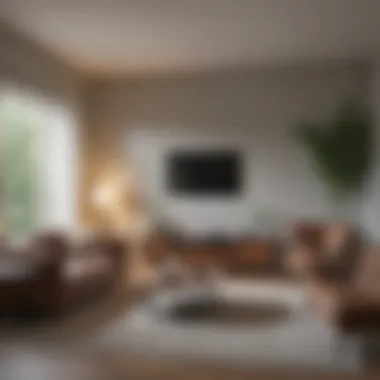A Comprehensive Comparison: Lutron vs. Hunter Douglas in Home Automation & Window Treatments


Product Overview
When considering the intricacies of Lutron and Hunter Douglas, a fundamental grasp of their product offerings is paramount. Dive deep into the essence of these esteemed brands by exploring their wide array of home automation and window treatment solutions. From smart lighting systems to motorized blinds, each product is meticulously designed to cater to the modern homeowner's needs. Discover the nuances of their key features, ranging from cutting-edge technology integration to sleek design aesthetics.
Technology Integration
In the realm of home automation, technology integration stands at the forefront of innovation. Lutron and Hunter Douglas both excel in seamlessly integrating technology into everyday living spaces, elevating convenience and efficiency. Experience the prowess of Lutron's proprietary systems that synchronize lighting, shading, and even music with unparalleled precision. Meanwhile, Hunter Douglas offers a harmonious blend of motorized blinds and shades that effortlessly sync with smart home devices, enhancing the overall ambiance with a touch of sophistication.
Design Excellence
Delve into the world of design excellence with Lutron and Hunter Douglas as they redefine the aesthetics of home automation and window treatments. Explore Lutron's minimalist designs that exude sophistication, complementing any interior seamlessly. Contrastingly, Hunter Douglas impresses with a versatile range of stylish blinds and shades that cater to diverse preferences, from timeless classics to contemporary chic.
Functionality and User Experience
Uncover a new realm of functionality and user experience with Lutron and Hunter Douglas. From intuitive app controls to voice command integration, each brand offers a user-centric approach to home automation. Delight in the seamless operation of Lutron's lighting controls and shading solutions, designed to simplify daily routines. Meanwhile, Hunter Douglas prioritizes ease of use with motorized blinds that grant effortless control over light filtration and privacy, enhancing the overall living experience.
Pricing and Value Proposition
When it comes to pricing and value proposition, Lutron and Hunter Douglas each present a compelling case for investment. Evaluate the cost-effective solutions by Lutron, which combine premium quality with affordability, making advanced home automation accessible to a wider audience. In contrast, Hunter Douglas positions itself as a premium choice for those seeking bespoke window treatments that marry luxury with functionality. Compare and contrast the pricing options and value propositions offered by these brands to make an informed decision that aligns with your budget and lifestyle.
Introduction
In the realm of home automation and window treatments, a comparison between Lutron and Hunter Douglas holds immense significance. These two prominent brands stand at the forefront of innovation and excellence in their respective fields. To embark on understanding the differences and nuances between Lutron and Hunter Douglas is to delve into a world where technology seamlessly integrates with everyday living spaces. This exploration is not merely about assessing products but about deciphering the intricate harmony between cutting-edge solutions and design aesthetics.
As we navigate through the labyrinth of smart homes and sophisticated window treatments, the comparison between Lutron and Hunter Douglas becomes a compass guiding us towards informed decisions. It shines a light on the nuanced aspects of technology integration, design offerings, functionality, and pricing that ultimately shape our living environments. By unraveling these layers, we can unlock a treasure trove of insights that empower us to tailor our homes to our unique preferences and requirements.
The Introduction sets the stage for a riveting journey through the landscapes of Lutron and Hunter Douglas, capturing not just the surface-level features but delving deep into the core elements that define these brands. This section will foreshadow the key discussions to follow, laying a solid foundation for readers to immerse themselves in the intricacies of home automation and window treatments. Through a detailed exploration of various parameters, we will uncover the essence of what sets Lutron and Hunter Douglas apart, catering to the discerning tastes of tech enthusiasts and home decor aficionados alike.


Background of Lutron and Hunter Douglas
In the realm of home automation and window treatments, understanding the historical background and evolution of leading brands like Lutron and Hunter Douglas is crucial. Lutron, a pioneer in the field, boasts a legacy of innovation spanning several decades. Established in the late 1950s by Joel Spira, Lutron has been at the forefront of developing cutting-edge lighting control systems, earning a reputation for unparalleled quality and performance. On the other hand, Hunter Douglas, with its roots tracing back to the early 20th century, revolutionized the window treatment industry with its range of products that blend style with functionality.
Delving into the background of these industry giants unveils a tapestry of technological advancements and design revolutions that have reshaped modern homes. Lutron's journey from introducing the first rotary dimmer to producing sophisticated smart home solutions showcases its commitment to staying ahead of the technological curve. Hunter Douglas, known for its innovative window coverings like the Duette Honeycomb Shade, has consistently set new standards in aesthetics and energy efficiency.
Examining the background of Lutron and Hunter Douglas sheds light on their core philosophies and approaches to home automation and window treatments. While Lutron has focused on creating comprehensive lighting control systems that cater to various needs, Hunter Douglas has excelled in providing a diverse range of window treatment options that marry form and function seamlessly. Understanding the unique histories and trajectories of these brands is paramount in appreciating the depth and scope of their current product offerings and market positions.
By exploring the historical foundations of Lutron and Hunter Douglas, enthusiasts and tech aficionados can gain a nuanced perspective on how these industry leaders have shaped the landscape of home automation and window treatments. Their evolution from humble beginnings to global prominence underscores the innovation and vision that drive their continued success in an ever-evolving market landscape.
Technology Integration
In this section, we delve into the crucial aspect of Technology Integration in the comparison between Lutron and Hunter Douglas. Technology Integration plays a pivotal role in enhancing the functionality and convenience of home automation systems, making it a key consideration for consumers looking to invest in smart solutions. Both Lutron and Hunter Douglas offer sophisticated technology integration features that seamlessly merge with modern households, providing users with advanced control over their lighting and window treatments.
Lutron's technology integration emphasizes seamless connectivity with smart home ecosystems, allowing for effortless synchronization with popular platforms like Apple Home Kit, Amazon Alexa, and Google Assistant. This interoperability ensures a streamlined user experience, where users can effortlessly manage their lighting and shades through voice commands or mobile applications. On the other hand, Hunter Douglas excels in integrating with existing home automation systems, offering compatibility with leading smart hubs and protocols to create a holistic smart environment within the home.
Smart Home Compatibility
Smart Home Compatibility is a pivotal aspect to explore when comparing Lutron and Hunter Douglas. Lutron stands out for its seamless integration with various smart home technologies, enabling users to control their lighting and shades effortlessly through voice commands or smartphone apps. The brand's compatibility with Apple Home Kit provides Apple enthusiasts with a seamless solution to manage their home's ambiance.
Similarly, Hunter Douglas prioritizes smart home compatibility by offering support for popular smart home platforms like Amazon Alexa and Google Assistant. This compatibility allows users to incorporate Hunter Douglas window treatments into their existing smart home setup, enhancing the overall convenience and functionality of their living space.
Voice Control Features
Voice Control Features play a vital role in enhancing the user experience with smart home devices. Lutron and Hunter Douglas cater to tech-savvy consumers by integrating advanced voice control capabilities into their products. Lutron's voice control features are designed to work effortlessly with virtual assistants like Siri and Alexa, allowing users to adjust lighting and shades with simple voice commands.
In comparison, Hunter Douglas empowers users with intuitive voice control functionalities that complement their range of motorized shades and blinds. By enabling voice commands through Amazon Alexa or Google Assistant, Hunter Douglas ensures a hands-free and convenient operation of window treatments, adding a touch of luxury and modernity to any home.
Integration with Existing Systems


Integration with Existing Systems is a critical consideration for consumers seeking to incorporate new technologies into their current setup. Both Lutron and Hunter Douglas offer robust integration capabilities that allow for seamless connectivity with existing smart home systems. Lutron's devices are designed to integrate smoothly with a wide range of smart home platforms and protocols, ensuring compatibility with various ecosystems without the need for additional accessories.
On the other hand, Hunter Douglas focuses on compatibility with popular smart hubs and automation systems, enabling users to effortlessly incorporate their motorized window treatments into their existing setup. By providing seamless integration with platforms like Samsung Smart Things or Control4, Hunter Douglas ensures that users can enhance their home automation experience without disrupting their current ecosystem.
Design Offerings
In this segment, we delve into the critical aspect of 'Design Offerings' within the context of comparing Lutron and Hunter Douglas. Design plays a pivotal role not only in the aesthetics but also in the overall functionality and user experience of home automation and window treatments. When considering Design Offerings, we must examine specific elements that distinguish Lutron and Hunter Douglas, understanding the benefits and considerations associated with each.
Aesthetics and Customization
Aesthetics and Customization represents a fundamental component when evaluating home automation and window treatments. With Lutron and Hunter Douglas, a key focus is on providing a diverse range of styles to cater to various preferences and interior themes. Both brands offer customization options, allowing users to personalize their choices to harmonize with their home décor. Understanding the significance of tailored solutions, Lutron and Hunter Douglas aim to enhance not only the visual appeal but also the functionality of their products, demonstrating a commitment to meeting individual needs and design aspirations.
Material Quality and Range
Material Quality and Range form another crucial consideration when comparing Lutron and Hunter Douglas. The materials used in construction significantly impact durability, performance, and overall user satisfaction. Lutron and Hunter Douglas boast an extensive range of materials, from high-quality fabrics to advanced technological components, ensuring a diverse selection to meet varying requirements. Evaluating material quality empowers consumers to make informed decisions based on the longevity and performance of the products. By scrutinizing the material range of both brands, individuals can identify the most suitable options that align with their expectations and usage scenarios.
Innovative Design Elements
Innovative Design Elements signify the cutting-edge features and advancements introduced by Lutron and Hunter Douglas in their products. Beyond conventional design aspects, both brands incorporate innovative elements that push the boundaries of traditional home automation and window treatments. From smart sensors to adaptive control systems, Lutron and Hunter Douglas integrate state-of-the-art technologies to elevate user experiences and optimize functionality. By exploring these innovative design elements, consumers can appreciate the forward-thinking approaches adopted by Lutron and Hunter Douglas, setting them apart as industry leaders in delivering modern and sophisticated home solutions.
Functionality and Features
In this article, the focus lies heavily on the functionality and features offered by both Lutron and Hunter Douglas. Understanding the intricate details of these aspects is vital in making an informed choice between the two brands. When it comes to smart home technology, automation capabilities, light control options, and remote access play a crucial role. The ability to integrate seamlessly with existing systems, make adjustments remotely, and customize the lighting to suit different moods are at the core of these features.
Automation Capabilities
Automation capabilities are a key component when comparing Lutron and Hunter Douglas. Both brands offer advanced automation features that significantly enhance the convenience and efficiency of home management. From scheduling lighting adjustments to automating blinds based on time of day or weather conditions, these capabilities streamline daily routines and contribute to energy efficiency. The intuitive automation interfaces of both Lutron and Hunter Douglas make it easy for users to personalize their settings and create a truly smart home environment.


Light Control Options
Light control options provided by Lutron and Hunter Douglas are designed to cater to diverse preferences and requirements. Whether it's adjusting the intensity of light, setting up automated lighting sequences, or integrating with voice control for hands-free operation, both brands offer a wide range of options to customize the ambiance of any space. The precision and flexibility of light control features enable users to create the perfect lighting environment for various activities, from cozy evenings to productive work sessions.
Remote Access and Operation
Remote access and operation capabilities offered by Lutron and Hunter Douglas empower users with the flexibility to control their home environment from anywhere. With remote access features, individuals can manage lighting and window treatments even when they are not physically present at home. This level of control enhances security, convenience, and energy efficiency by allowing seamless adjustments based on real-time needs. The intuitive interfaces of Lutron and Hunter Douglas apps ensure a user-friendly experience, making remote operation simple and accessible for all users.
Pricing and Value Proposition
In this section, we delve into the crucial aspect of Pricing and Value Proposition in the context of comparing Lutron and Hunter Douglas. Pricing plays a pivotal role in the decision-making process when choosing home automation and window treatment solutions. The value proposition offered by both brands is a key consideration for consumers looking for a balance between cost and features.
Cost Comparison
When comparing the costs between Lutron and Hunter Douglas, it is essential to look beyond the initial price tags. Both brands may have different pricing structures based on their technologies, materials used, and customization options. Lutron's products may typically have a higher upfront cost due to their advanced automation capabilities, while Hunter Douglas might offer more budget-friendly options without compromising on quality.
Long-Term Durability and Maintenance
The long-term durability and maintenance requirements of home automation systems and window treatments are crucial factors to consider. Lutron and Hunter Douglas are reputed for their durable products, designed to withstand daily use and environmental factors. Understanding the maintenance needs of each brand's offerings can provide insights into the overall cost of ownership over time.
Warranty and Customer Support
Warranty coverage and customer support are essential components of the value proposition for any consumer investing in home automation and window treatments. Lutron and Hunter Douglas both offer varying warranty periods and after-sales services to ensure customer satisfaction. Evaluating the terms of warranty, including coverage for parts and labor, can inform consumers about the level of support they can expect from each brand.
Conclusion Lutron vs. Hunter Douglas
The conclusion serves as a pivotal component in this exhaustive comparison between Lutron and Hunter Douglas. It consolidates the key aspects discussed throughout the article, offering readers a synthesized view to aid in decision-making. Understanding the diverse nuances between these two brands is imperative for individuals seeking premium home automation solutions.
This section elucidates the critical importance of making an informed choice when it comes to integrating smart technology and luxurious window treatments into living spaces. By dissecting the technological prowess, design finesse, functional attributes, and cost implications of Lutron and Hunter Douglas, readers are empowered to deliberate on the most suitable option for their specific requirements.
Evaluating the intricate details of how these brands align with smart home ecosystems, deliver exquisite design aesthetics, support varied functionality, and justify their pricing structures unveils a landscape filled with opportunities and considerations. The sophistication and convenience that these products offer necessitate a thorough comprehension of their strengths and limitations.
Moreover, the nuanced comparison underscores a conscientious approach towards balancing short-term advantages with long-term investments. The warranty and customer support dimensions play a critical role in ensuring a seamless user experience post-purchase. Additionally, the durability and maintenance implications underscore the need for a sustainable and value-driven decision-making approach.
In essence, this section encapsulates the essence of the entire comparison journey, urging readers to delve deeper into their preferences, ideals, and practical requirements to make an educated choice between Lutron and Hunter Douglas. The meticulous exploration of each brand's offerings fosters a comprehensive understanding, enabling consumers to navigate the complexities of home automation and window treatments with clarity and confidence.















